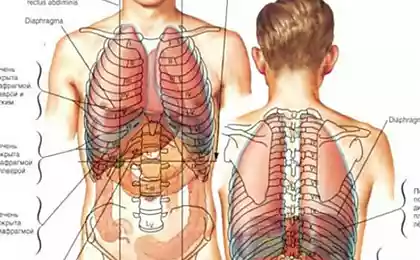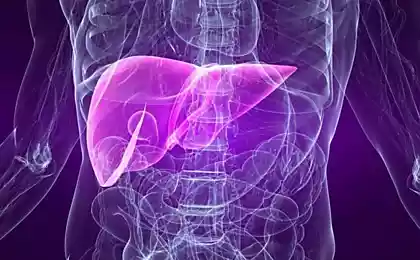255
How anger is eating away at the liver

The relationship between emotions and liver health: invisible but real biochemical processes
The liver is a unique and irreplaceable organ, a real biochemical laboratory of our body, performing more than 500 different functions. This powerful blood filter, neutralizing toxins, is involved in the metabolism of proteins, fats and carbohydrates, synthesizes the most important blood proteins and regulates many processes in the body. But what happens to this vital organ when we experience intense negative emotions, especially anger and anger? Modern science is increasingly confident about the direct connection between the emotional state of a person and the health of his liver. This connection goes far beyond folk wisdom and finds more and more confirmation in scientific research.
The liver and emotions: a scientific view of ancient wisdom
In traditional Chinese medicine, for more than 2,000 years, the liver has been considered an organ closely related to the human emotional sphere. The liver stores and regulates the energy of anger. Modern science, initially skeptical of such concepts, is now showing increasing evidence of the real impact of emotional state on liver physiology.
Studies show that chronic stress, persistent irritation, and especially repressed anger activate the sympathetic nervous system, triggering a cascade of biochemical reactions that negatively affect the liver. There is a release of cortisol and adrenaline - stress hormones, which, being in the blood in high concentrations for a long time, disrupt the normal functioning of hepatocytes - liver cells.
According to Mayo Clinic research, psychological stress can exacerbate many liver diseases, including non-alcoholic fatty liver disease, chronic hepatitis and cirrhosis. In patients with high levels of chronic stress and anger, the processes of regeneration of liver tissue are much slower.
The mechanisms of destruction: how negative emotions affect the liver
The process of the effect of negative emotions on the liver can be described in the form of several interrelated mechanisms:
1. Hormonal imbalance
When experiencing anger, rage and other negative emotions, the hypothalamic-pituitary-adrenal axis is activated, which leads to the release of stress hormones - cortisol and adrenaline. In the short term, this is a normal reaction of the body, but with chronic stress and constant anger, the level of these hormones remains elevated, which disrupts metabolic processes in the liver.
High levels of cortisol stimulate the formation of glucose through gluconeogenesis in the liver, which can contribute to the development of insulin resistance and the accumulation of fat in the liver cells. In addition, hormonal imbalance can lead to impaired lipid metabolism and an increase in the risk of developing non-alcoholic fatty liver disease (NAFLD).

Effects of stress hormones at the cellular level: visualization of biochemical processes in the liver
2. Oxidative stress and inflammation
Prolonged negative emotional states, especially chronic anger, activate the processes of oxidative stress in the body. At the same time, an excessive amount of free radicals is formed - highly active molecules that damage cellular structures, including liver cells. The liver’s antioxidant system, designed to neutralize these aggressive compounds, depletes over time, leading to the accumulation of oxidative damage.
In parallel with this, pro-inflammatory cytokines are activated in the body - molecules that trigger and support inflammatory processes. Chronic inflammation in the liver gradually leads to fibrosis - the replacement of normal liver connective tissue, which reduces the functionality of the organ.
3. Disturbance of the gut microbiome
Modern research shows that emotional stress and negative emotions can significantly affect the composition of the intestinal microflora. Disruption of the balance of the intestinal microbiota, in turn, leads to increased permeability of the intestinal wall, which allows toxins and bacterial products to enter the bloodstream and reach the liver through the portal vein.
This phenomenon is called “intestinal permeability syndrome” or “leaky bowel syndrome”. The liver, which is already working at its limits, receives an additional toxic load, which exacerbates existing problems and can lead to the development or progression of liver disease.
Attention! Chronic uncontrolled anger and constant irritation can become catalysts for the development of serious liver diseases such as non-alcoholic steatohepatitis, fibrosis and even cirrhosis. Studies show that patients with high levels of psychological stress have a higher risk of liver disease progression and worse rates of treatment effectiveness.
Emotions in traditional medicine: not just a metaphor
Interestingly, the connection between emotions and the liver has long been described in various medical traditions of the world. In traditional Chinese medicine, the liver has been associated with anger emotion, believing that it is this organ that stores and regulates anger. In Ayurveda (ancient Indian medicine), the liver is considered an organ associated with the element of fire and the emotion of irritation.
Modern neurobiological research confirms these ancient concepts, demonstrating the real physiological mechanisms of the influence of emotions on the state of internal organs through the neuroendocrine system and the autonomic nervous system. The theory of psychosomatics, which develops ideas about the relationship between psychological experiences and physiological processes, also includes the concept of emotional-organic connections, where the liver is most often associated with anger, irritation and anger.
Practical recommendations: how to protect the liver from the destructive effects of emotions
Understanding the mechanisms of the effect of negative emotions on the liver provides an opportunity to develop strategies to protect this vital organ. We offer a comprehensive approach to solving this problem:
Emotional regulation and dealing with anger
- Awareness and attentiveness to your emotions. Regularly practice self-observation, tracking the occurrence and development of negative emotions. Use mindfulness techniques or journaling emotions to better understand your emotional reactions.
- A healthy expression of emotion. Instead of suppressing anger, find acceptable ways to express it: physical activity, talking to a trusted person, and creative expression.
- Relaxation techniques. Regularly practice breathing exercises, progressive muscle relaxation, meditation, or yoga to reduce overall stress and tension levels.
- Cognitive behavioral techniques. Work with dysfunctional thoughts that generate anger. Explore your beliefs and attitudes that can cause excessive reactions of irritation and malice.

Mindfulness and meditation practices help harmonize emotions and maintain liver health
Liver support through nutrition and lifestyle
- Antioxidant support. Include in the diet foods rich in antioxidants: berries, dark green leafy vegetables, nuts, seeds, spices (turmeric, ginger). These products help neutralize free radicals formed during oxidative stress.
- Anti-inflammatory diet. Give preference to foods with anti-inflammatory properties, such as fatty fish (a source of omega-3 fatty acids), olive oil, avocado. Limit your intake of refined carbohydrates and processed foods, which can increase inflammation.
- Support for gut microbiota. Eat fermented foods (kefir, yogurt, sauerkraut), prebiotics (onions, garlic, artichokes) and probiotics to maintain a healthy balance of intestinal microflora, which indirectly reduces the load on the liver.
- Regular physical activity. Moderate physical activity not only reduces stress levels and improves emotional state, but also directly affects the metabolism in the liver, reducing the risk of developing fat dystrophy.
- Full sleep. Adequate and quality sleep is critical for restorative processes in the body, including the liver. Aim for 7-8 hours of sleep per night and maintain a regular sleep regimen.
Integrative approach to liver health
Modern research confirms the effectiveness of an integrated approach to maintaining liver health, including both traditional medical methods and integrative medicine practices. The following approaches have proven themselves well:
- Herbal medicine. Some plants have scientifically confirmed hepatoprotective properties. These plants include milk thistle spotted (silymarin), turmeric (curcumin), dandelion, artichoke and others. It is important to remember that the use of any herbal preparations should be agreed with the doctor.
- Psychological support. In the presence of chronic problems with anger management and other negative emotions, it is advisable to consult a psychologist or therapist. Modern methods of psychotherapy, such as cognitive behavioral therapy, can significantly improve emotional regulation skills.
- Regular medical monitoring. If there are risk factors for liver disease, regularly undergo an examination, including a biochemical blood test and liver ultrasound.
Studies show that the combination of stress management techniques (meditation, breathing practices) with optimizing nutrition and physical activity can significantly improve liver function even in people with pre-existing liver disease. Especially effective was the combination of mindfulness practices with an anti-inflammatory diet and regular aerobic exercise of moderate intensity.
Conclusion: The Way to Emotional Harmony and Liver Health
The link between emotional state and liver health is a complex, multi-level system of interactions involving the nervous, endocrine, immune systems, and gut microbiome. Today, the scientific community recognizes that prolonged negative emotions, especially repressed anger and chronic anger, can cause serious liver disease or aggravate existing ones.
Understanding the mechanisms of this influence opens up new perspectives for the prevention and treatment of liver disease through emotional state management. Integrative approach, combining modern medical methods with the practices of emotional regulation, optimization of nutrition and lifestyle, seems to be the most promising direction of maintaining the health of this vital organ.
Liver health is not only the absence of physiological disorders, but also emotional well-being, the ability to constructively express their feelings and effectively cope with stress. Taking care of your emotional state is at the same time a concern for the health of the liver, and therefore for the health of the entire body.
Glossary
Hepatocytes
The main liver cells perform a variety of functions, including detoxification, protein synthesis and participation in the metabolism of carbohydrates, fats and proteins.
Oxidative stress
A state of the body in which there is an increased formation of free radicals - highly active molecules that damage cellular structures, which can lead to various diseases and accelerated aging.
Non-alcoholic fatty liver disease (NAFLD)
The spectrum of liver diseases characterized by the accumulation of fat in the liver cells in persons who do not drink alcohol in quantities that can cause liver damage.
Hypothalamic-pituitary-adrenal axis
A complex system of interactions between the hypothalamus, pituitary and adrenal glands that regulates the body's responses to stress by producing hormones, including cortisol.
Gut microbiome
The set of microorganisms that inhabit the human intestine, playing an important role in digestion, immunity and other aspects of health.
gluconeogenesis
The metabolic pathway in which glucose is synthesized from non-carbohydrate precursors such as amino acids, lactate, and glycerol. Actively occurs in the liver, especially in stressful conditions.
Liver fibrosis
A pathological process characterized by excessive formation of connective tissue in the liver in response to various damaging factors, which disrupts the normal structure and function of the organ.
Hepatoprotectors
Substances that have a protective effect on the liver, contributing to the restoration of its functions and structure in various injuries.
Sources and additional information
1. The World Health Organization (WHO). Information bulletin on liver diseases.
2. European Association for the Study of the Liver (EASL). Clinical recommendations for the management of patients with non-alcoholic fatty liver disease.
3. American Association for the Study of Liver Diseases (AASLD). Guidelines for the diagnosis and treatment of non-alcoholic fatty liver disease.
4. Stress, emotion regulation and liver health: A systematic review in Journal of Psychosomatic Research, 2023.
5. Chen L, et al. “The gut-liver axis in health and disease: The biological mechanisms and clinical implications” in Nature Reviews Gastroenterology & Hepatology, 2022.
Adrenal glands: culprits of fear and fatigue?
If a man constantly criticizes you: who is to blame and what to do























